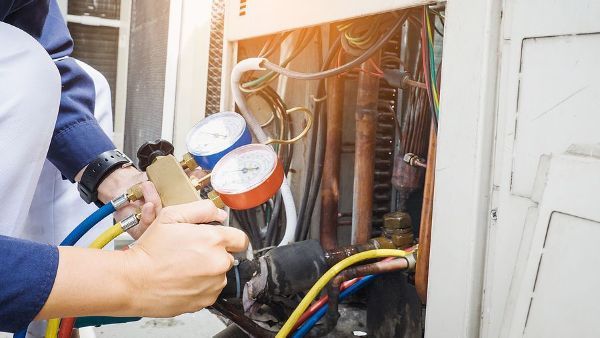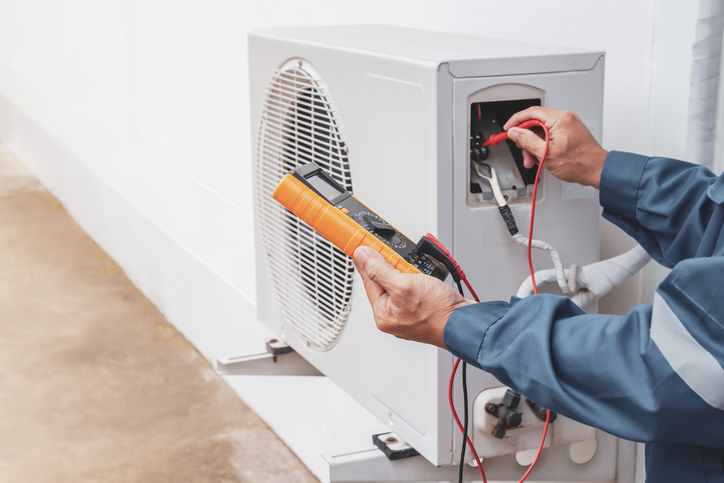Signs that you need air conditioner repair immediately
Wiki Article
All About Heating And Cooling: Identifying Common Issues and Effective AC Fixing Techniques
Heating and cooling systems are essential for preserving indoor convenience. Understanding their elements and functionality is necessary for identifying typical issues. Property owners commonly face problems such as inadequate air conditioning, weird odors, or rising power costs. These indicators can show underlying concerns that might require focus. Exploring do it yourself troubleshooting methods can be advantageous, however recognizing when to look for professional aid is equally vital. What steps can be required to guarantee resilient performance?Understanding Your Heating And Cooling System: Elements and Capability
A heating and cooling system, frequently taken into consideration the foundation of indoor climate control, contains several essential components that interact to regulate temperature and air quality. The key components consist of the heating system, ventilation system, and a/c device. The heating system, usually a furnace or central heating boiler, creates heat throughout colder months, while the cooling system cools down indoor rooms throughout the summertime.
Typical HVAC Issues House Owners Encounter
Homeowners typically deal with numerous usual cooling and heating problems, including irregular temperature level distribution throughout their space. Furthermore, unusual sounds throughout operation can show underlying concerns that require focus. Resolving these worries quickly is crucial for preserving ideal system performance.Irregular Temperature Level Distribution
Lots of families experience the discouraging problem of inconsistent temperature level distribution, where particular rooms really feel uncomfortably cozy while others continue to be also chilly. This problem usually arises from a selection of aspects, including bad insulation, obstructed vents, or an incorrectly sized HVAC system. When ducts are not properly sealed or when furnishings blocks air movement, some areas may obtain inadequate cooling. Furthermore, thermostat placement can greatly influence temperature law; a thermostat located in a sunlit area might misrepresent the total temperature of your house. Normal maintenance, including cleansing filters and ensuring ductwork is clear, can aid alleviate these discrepancies. Property owners may also think about zoning systems to far better control temperature levels throughout different areas of the home, promoting an extra comfy living atmosphere.Uncommon Sounds Throughout Procedure
When a HVAC system runs, uncommon noises can suggest underlying concerns that need focus. Property owners might encounter a series of sounds, such as grinding, squealing, or hissing. Grinding noises usually indicate damaged bearings or components, while squeaking can recommend loosened belts or parts needing lubrication. Hissing might indicate a cooling agent leakage, which can endanger the system's efficiency. Additionally, banging noises may indicate loosened ductwork or an issue with the blower fan. Each of these noises acts as a warning, motivating property owners to explore better. Disregarding these indicators can bring about more significant troubles and expensive repairs. Normal maintenance and punctual interest to unusual sounds can enhance system long life and performance, ensuring a comfy living atmosphere.Indicators That Indicate Your A/c Needs Fixing
Exactly how can one inform if their air conditioning device is in requirement of repair? A number of signs might show underlying problems requiring specialist interest. First, if the a/c fails to cool the room efficiently, it might suggest a cooling agent leak or compressor breakdown. Additionally, a rise in power bills without corresponding use changes could indicate inadequacy in the system. Home owners ought to likewise be sharp to unusual smells originating from the system, which can indicate mold growth or electric concerns. If the Air conditioner frequently cycles on and off, it may be an indication of a damaged thermostat or other mechanical issues. The existence of water pooling around the system can indicate a clogged drain line. Acknowledging these indicators early can conserve time and cash, making certain that the air conditioning system operates successfully and properly.Do It Yourself Troubleshooting Techniques for HVAC Issues
When facing HVAC issues, homeowners can employ numerous do it yourself repairing techniques to identify the trouble. Trick approaches consist a knockout post of inspecting thermostat settings, examining air filters, and examining water drainage concerns. These actions can assist pinpoint common breakdowns prior to seeking expert help.Inspecting Thermostat Setups
What actions should homeowners take to assure their thermostat settings are appropriate? Initially, they should validate the thermostat is set to the preferred temperature level and mode, whether home heating or air conditioning. Inspecting for a clear display and confirming the thermostat is not established to "hold" or "holiday" setting is crucial. Homeowners need to additionally confirm that the thermostat is degree and set up in a place without drafts, direct sunlight, or other temperature level influences. Additionally, altering the thermostat can help give accurate analyses. If the thermostat operates batteries, changing them might deal with any kind of problems. By methodically evaluating these elements, property owners can usually determine and fix thermostat-related problems, advertising ideal a/c system performance.Inspecting Air Filters
Air filters play a crucial role in preserving excellent heating and cooling efficiency. They catch dirt, allergens, and other bits, ensuring clean air flow. Over time, filters can end up being clogged up, reducing airflow and effectiveness. To evaluate air filters, people should first find the filter, usually located in the return air duct or near the furnace. When situated, they need to evaluate the filter's condition-- if it appears dirty or tarnished, it most likely requirements substitute. A lot of filters call for transforming every 1-3 months, relying on use and ecological aspects. Routine examination and prompt substitute of air filters not just improve air high quality however likewise extend the lifespan of heating and cooling systems, protecting against possible breakdowns and pricey fixings.
Examining Water Drainage Issues
Exactly how can house owners successfully determine and deal with water drainage concerns within their a/c systems? They ought to examine the condensate drain line for obstructions or clogs, which can lead to water accumulation. Home owners may use a wet/dry vacuum cleaner to remove any type of debris obstructing the line. Next off, inspecting the drain frying pan for corrosion or leakages is necessary, as a damaged pan can create water to overflow. Normal cleansing of this content the drain line with a combination of vinegar and water assists stop future clogs. Furthermore, guaranteeing appropriate incline of the drain line advertises efficient water circulation. If these DIY techniques do not solve the issue, consulting a specialist heating and cooling technician may be necessary to stay clear of prospective water damages and system failure.When to Call a Specialist for Air Conditioning Repairs

While some AC problems can be taken care of through do it yourself approaches, there are circumstances where calling a specialist becomes crucial. Homeowners must seek professional assistance when they run into relentless problems, such as insufficient air conditioning, strange noises, or uncommon odors emanating from the system. These signs and symptoms may indicate much deeper concerns that need specialized expertise and devices to diagnose and repair correctly.

Preventative Upkeep Tips for HVAC Durability
Normal preventative maintenance can considerably boost the longevity of heating and cooling systems. Home owners should arrange yearly examinations by certified service technicians to analyze system efficiency and identify prospective concerns. Frequently transforming or cleansing air filters is important, as this assurances appropriate air flow and lowers pressure on the system. On top of that, checking and sealing ductwork stops power loss and boosts total efficiency.
It is additionally advisable to keep the outside system free from particles and plants, enabling peak air movement and warmth exchange. Homeowners should inspect the condensate drainpipe for clogs to prevent water damages and mold and mildew growth. Moreover, maintaining appropriate thermostat setups and making use of programmable choices can enhance energy efficiency. Documenting maintenance tasks assists track service background and can assist in recognizing persisting problems. By following these preventative actions, individuals can take full advantage of the efficiency and lifespan of their heating and cooling systems
Frequently Asked Questions
Just how Commonly Should I Replace My A/c System Filters?
Heating and cooling system filters should commonly be replaced every one to 3 months, depending on use, filter type, and ecological variables. Normal replacement aids keep efficiency and air top quality, guaranteeing peak system performance throughout the year.What Dimension Heating And Cooling System Do I Need for My Home?
To determine the ideal heating and cooling system size for a home, one must think about square video, insulation top quality, and local climate. Consulting an expert can assist assure optimal performance and comfort for the specific living space.Are There Eco-Friendly A/c Options Available?
Yes, green cooling and heating options are available, including energy-efficient heat pumps, solar-powered systems, and geothermal heating. These alternatives decrease energy consumption and environmental impact, promoting sustainability while maintaining reliable environment control for household and business rooms.Just How Can I Enhance My a/c System's Energy Effectiveness?
To improve HVAC energy performance, one can regularly keep the system, Your Domain Name seal air leakages, set up programmable thermostats, utilize energy-efficient filters, and guarantee adequate insulation throughout the home to reduce power intake and improve performance.
What Is the Average Life-span of a Heating And Cooling System?
The ordinary life-span of a heating and cooling system commonly ranges from 15 to 25 years, depending upon variables such as maintenance, usage, and the high quality of installment. Regular upkeep can substantially extend its operational durability.Verdict
In summary, an extensive understanding of cooling and heating systems empowers property owners to determine usual concerns and address minor problems efficiently. Identifying indicators of malfunction, employing DIY fixing strategies, and focusing on normal upkeep can boost system performance and effectiveness. Nonetheless, when confronted with complex repair work, employing expert aid is critical to guarantee safety and longevity. By cultivating recognition and aggressive treatment, people can take pleasure in a comfy interior atmosphere while lessening unforeseen expenses related to cooling and heating failings.Report this wiki page